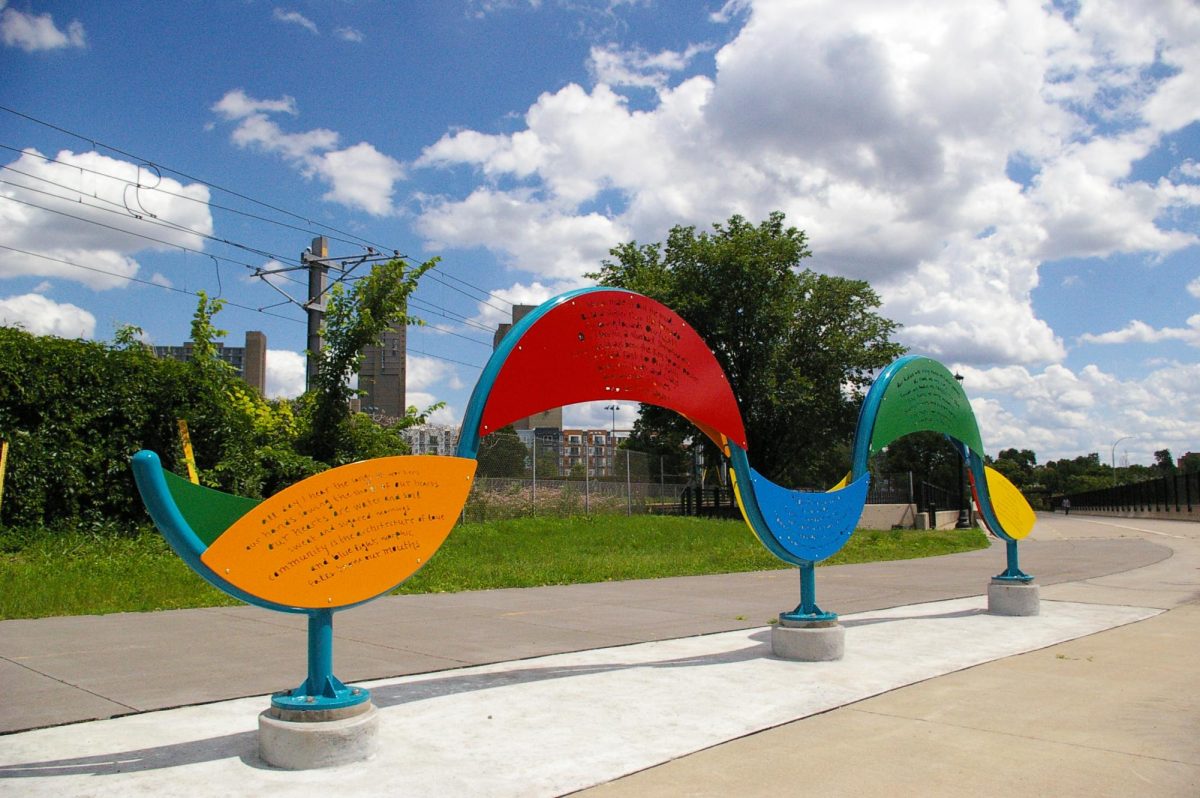A new public artwork at Samatar Crossing in Cedar-Riverside is dedicated to the first Somali-American elected to public office in Minnesota, Hussein Samatar.
The artwork, called Common Currents, consists of two sections of a sculpture at each end of the Samatar Crossing bike trail. The sculpture, by local artists Ifrah Mansour, Aaron Marx and Randy Walker, depicts wave-like panels, each with a poem from six local poets.
Minneapolis Public Arts Department Administrator Mary Altman said the public art at Samatar Crossing will become a part of the area’s identity and celebrate the community while also celebrating the late Samatar.
“One of the things that public art can do is really celebrate community identity,” Altman said. “It can also help make a place a unique and special place, and become part of what that place is known for.”
Samatar immigrated to Minneapolis in 1991, four days after graduating from Somalia’s National University, due to the outbreak of civil war in Somalia. In Minnesota, he received his Master of Business Administration from the University of St. Thomas in 2004 and was selected as a Humphrey Institute Policy fellow from 2003-2004.
Altman said Common Currents took around seven years. Between the COVID-19 pandemic and commissioning several poets for the work, Altman said this particular project had more layers than others.
The poems on the panels, by poets Sun Yung Shin, Sharon M. Day, ShaVunda Brown, Aegor Ray, Ahmed Said Salah, Sixco and Mohamed Shariff, honor themes of Samatar’s legacy such as immigration, community and connecting cultures.
Altman said the public art advisory panel looks at all public art projects and selects them based on importance to the community. During the planning process for Common Currents, outreach to the Minneapolis Somali community was critical for feedback and Samatar’s legacy, Altman added.
“One of the things that made it so attractive to the public art advisory panel as a potential project was the opportunity to honor Samitar and also the opportunity to create an artwork that celebrated the history of immigration into Minneapolis,” Altman said.
Altman said former Minneapolis Mayor R.T. Rybak pushed the vision of the Samatar Crossing bike trail while ensuring Samatar’s name stayed in the community.
Rybak appointed Samatar to the Minneapolis Public Library Board in 2006, putting him into public office for the first time.
Samatar ran unopposed for the same position in 2010, but the election was tense for many reasons, including how there would be no African American representation on the board without him. Besides his work on the Library Board, Samatar founded the African Development Center in 2004 to help immigrants start local businesses.
Samatar died in August 2013 at the age of 45 due to complications from leukemia. According to an interview with MinnPost, Samatar disagreed with calling himself a Somali American. To him, he was just an American.
“I always felt that no matter where we came from, if we are to be serious to be part of Minnesota and of the United States and we took the allegiance to be naturalized or to be born to an immigrant family, we are Americans,” Samatar said “So I always tell you if at all possible to avoid the hyphenate. I consider myself to be an American.”









Gina
Jul 24, 2024 at 1:54 pm
It’s nice to see a public art sculpture which also involves poets, especially local poets!
Ken DeYoe
Jun 21, 2024 at 3:06 pm
Society should stop building monuments to memorialize people. All people for any and all reasons. Period.